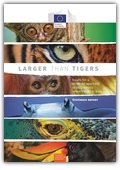Larger than tigers: inputs for a strategic approach to biodiversity conservation in Asia - synthesis report
 In many Asian cultures the tiger tops the lion as the king of all beasts. Symbolising power and strength, it also holds the potential for great violence and destruction. Asia's rich natural tapestry treads an equally fine balance, defining whether its people and communities simply survive or are able to thrive. Asia is home to over half of the world's population and almost one fifth of its land mass. These richly diverse terrestrial, freshwater and marine ecosystems have witnessed rapid population and economic growth. A large number of species are on the brink of extinction, and the population and available habitat of thousands more are dramatically declining. The European Union has long recognised the precious links between human development and our natural environment and is leading global efforts for conservation, as one of the largest contributors to biodiversity-related development assistance. The 2017 European Consensus on Development underlines the importance of integrating environmental considerations across all sectors of development cooperation and reiterates our commitment to address them together with our partners. This report highlights Asia's great natural capital and provides valuable information and analysis in support of a strategic approach to halting environmental degradation and biodiversity loss in the region. As its title suggests, the problem extends far beyond the survival of iconic animals such as tigers, orang-utans, elephants or rhinos. Vanishing species are important components of complex natural ecosystems that provide water and food, regulate climate, process waste products, pollinate crops, and support a growing tourism industry. Some of these services can only be replaced at a significant cost, while others are simply irreplaceable. The European Union is committed to supporting partner countries to mainstream biodiversity and ecosystems conservation into their own actions.
In many Asian cultures the tiger tops the lion as the king of all beasts. Symbolising power and strength, it also holds the potential for great violence and destruction. Asia's rich natural tapestry treads an equally fine balance, defining whether its people and communities simply survive or are able to thrive. Asia is home to over half of the world's population and almost one fifth of its land mass. These richly diverse terrestrial, freshwater and marine ecosystems have witnessed rapid population and economic growth. A large number of species are on the brink of extinction, and the population and available habitat of thousands more are dramatically declining. The European Union has long recognised the precious links between human development and our natural environment and is leading global efforts for conservation, as one of the largest contributors to biodiversity-related development assistance. The 2017 European Consensus on Development underlines the importance of integrating environmental considerations across all sectors of development cooperation and reiterates our commitment to address them together with our partners. This report highlights Asia's great natural capital and provides valuable information and analysis in support of a strategic approach to halting environmental degradation and biodiversity loss in the region. As its title suggests, the problem extends far beyond the survival of iconic animals such as tigers, orang-utans, elephants or rhinos. Vanishing species are important components of complex natural ecosystems that provide water and food, regulate climate, process waste products, pollinate crops, and support a growing tourism industry. Some of these services can only be replaced at a significant cost, while others are simply irreplaceable. The European Union is committed to supporting partner countries to mainstream biodiversity and ecosystems conservation into their own actions.
